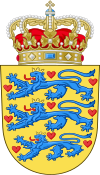- Danish nationality law
-
Danish nationality law is ruled by the Constitutional act of Denmark (of 1953) and the Consolidated Act of Danish Nationality (of 2003, with amendment in 2004).
Danish nationality can be acquired in one of the following ways:
- Automatically at birth, if the parents or one of the parent is a Danish citizen and is born in Denmark.
- Automatically if a person is adopted as a child under 12 years of age
- By declaration for nationals of another Nordic country
- By naturalisation, that is, by statute
Danish nationality can be lost in one of the following ways:
- Automatically if a person voluntarily acquires nationality of another country (whether after application or by entering the public service of another country)
- Automatically for an unmarried child under the age of 18 years upon acquisition of a foreign nationality in the setting of a parent who has acquired a foreign nationality and thereby lost his or her Danish nationality
- Automatically if a person acquired Danish nationality by birth, but was not born in Denmark and has never lived in Denmark by the age of 22 years (unless this would render the person stateless or the person has lived in another Nordic country for an aggregate period of no less than 7 years)
- By court order if a person acquired his or her Danish nationality by fraudulent conduct
- By court order if a person is convicted of violation of one or more provisions of Parts 12 and 13 of the Danish Criminal Code (unless this would render the person stateless)
- By voluntary application to the Minister for Refugee, Immigration and Integration Affairs (a person who is or who desires to become a national of a foreign country may be released from his or her Danish nationality by such an application)
Contents
Naturalisation as a Danish citizen
- One must have permanent residence status in Denmark in order to become a citizen, except in a few circumstances (e.g. adopted children). Unfortunately for non-EU citizens, the qualifying rules for permanent residence are quite restrictive, requiring at full time physical employment for at least 2.5 years despite having adequate income from other sources. This means a person working full time in a menial job cleaning toilets would qualify but a person who works freelance only a few months per year (but earning large amounts in this limited period of work) would not.
- 9 years of continuous residence, with restricted allowance for interrupted residence of up to 1 year or 2 years in special circumstances (education, family illness). Continuous residence is not clearly defined, but apparently one must state periods of absence from Denmark longer than 14 days.
- 8 years of continuous residence for people who are stateless or with refugee status
- Each year of marriage to a Danish citizen reduces the requirement by one year, to a maximum reduction of 3 years. For example, as little as 6 years of continuous uninterrupted residence for people who are married to Danish nationals for 3 years. One year of cohabitation before marriage counts as a year of marriage for this purpose.
- There is a special and little mentioned clause which allows for absences from Denmark of longer than 1 or 2 years if one is married to a Danish citizen. The total period of continuous residence should be at least 3 years and it must exceed the total periods of absence, AND either: the period of marriage being at least 2 years or the total period of residence in Denmark being 10 years less the period of marriage and 1 year for cohabitation before marriage). Unfortunately one must still have pemanent residence.
- If one is married to a Dane who must work in a foreign country 'for Danish interests', then the period of absence from Denmark can be regarded as residence in Denmark.
Multiple citizenship
Currently, it is a fundamental principal in the legislation to restrict dual nationality as much as possible.[1] One exception to this is if a person is born of a Danish parent in a country that grants citizenship under the principal of jus soli.[1] In October 2011, the newly elected centre-left coalition government has indicated its intention to permit dual citizenship.[2]
External links
- Danish nationality law [1]
Nationality laws (category) By continent AfricaAsiaArmenia · Azerbaijan · Bangladesh · Bhutan · Burma (Myanmar) · China · Cyprus (Northern Cyprus1) · India · Indonesia · Iran · Iraq · Israel · Japan · Kazakhstan · South Korea · Lebanon · Malaysia · Mongolia · Nepal · Pakistan · Philippines · Russia · Singapore · Taiwan · TurkeyOceaniaEuropeAndorra · Austria · Belarus · Belgium · Bulgaria · Croatia · Czech Republic · Denmark · Estonia · Finland · France · Germany · Greece · Hungary · Iceland · Ireland · Italy · Kazakhstan · Latvia · Lithuania · Luxembourg · Macedonia · Malta · Moldova · Monaco · Montenegro · Norway · Netherlands · Poland · Portugal · Romania · Russia · Serbia · Slovakia · Slovenia · Spain · Sweden · Switzerland · Ukraine · United KingdomNorth AmericaSouth AmericaInternational
organizationsBy type Other Defunct Notes 1 Partially unrecognised and thus unclassified by the United Nations geoscheme. It is listed following the member state the UN categorises it under.References
- ^ a b "Dual Nationality". New in Denmark (Ny i Danmark). New in Denmark. Updated: 2007-11-13. Retrieved 2011-10-27.
- ^ Bramsen, C.B. Danskere i udlandet har også rettigheder (in Danish). Politiken.dk. Retrieved 2011-10-26.
Categories:- Nationality law
- Danish law
Wikimedia Foundation. 2010.

